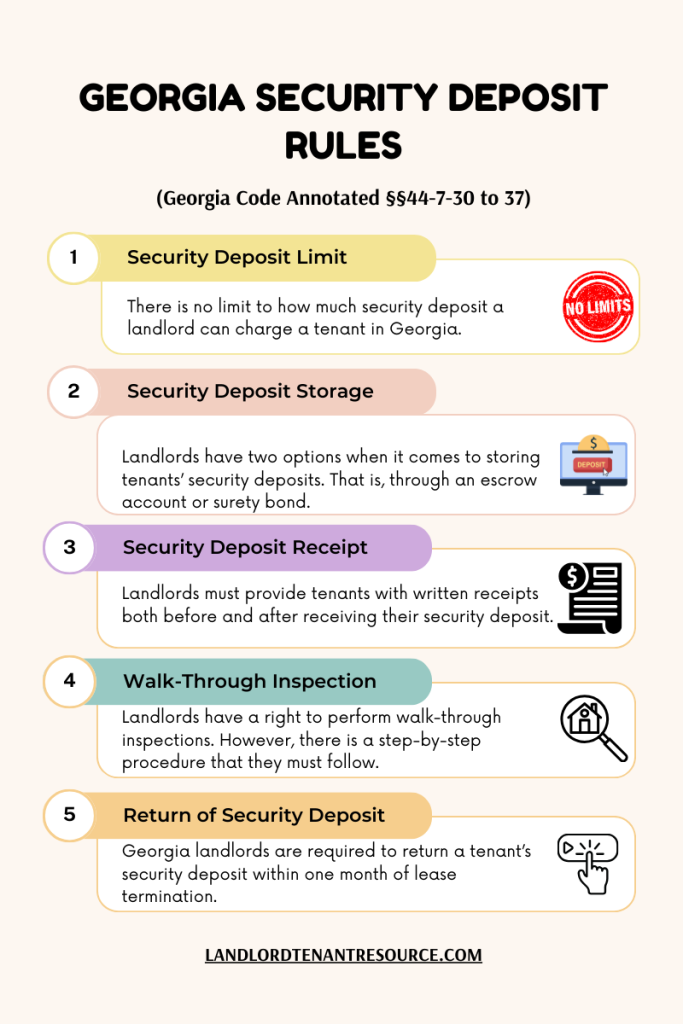Last Updated on April 13, 2024 by Kelvin Nielsen
As a Georgia landlord, it’s important to familiarize yourself with the provisions of the state’s landlord-tenant law (GA Code Title 44 Chapter 7). And among these provisions are the state’s security deposit rules.
The GA security deposit rules are a set of laws that landlords must abide by when handling tenants’ security deposit rules. In other words, they tell landlords what they can and cannot do when it comes to handling tenant’s security deposits.
The penalties for failing to abide by these rules can be pretty severe. In the case of unlawful withholding, for instance, you may be liable to paying the tenant up to 3X the wrongfully withheld amount, plus reasonable court and attorney fees.
The following are some key takeaways.

With that in mind, the following are the basics of the Georgia security deposit rules every landlord should be aware of.
Georgia Landlord Tenant Law on Security Deposit
Do the GA security deposit rules apply to all landlords?
No! The Georgia security deposit rules only apply to landlords renting out at least 10 units. You may also need to abide by these rules if you’ve hired a property manager to manage it on your behalf.
What is the maximum amount a landlord can charge as a security deposit in Georgia?
As a landlord, there is no limit to how much you can ask as a security deposit. You can charge as much or as little as you want. You’ll want, however, to be reasonable when calculating the amount to charge.
Ideally, a safe amount to ask should be no more than 2X the monthly rent. If charging, say, $1,500 as monthly rent, then a reasonable security deposit amount to charge should be no more than $3,000. This amount should be able to cover you in case of liabilities such as non-payment of rent, unpaid utilities, or even property damage.
Are there rules on how landlords must store their tenants’ security deposits?
Yes! GA security deposit rules dictate how landlords must store their tenants’ security deposits. You have two options for your consideration. They are as follows.
The first option is to store the deposit in an escrow account. The account must be in a financial or banking institution that is either regulated at the state or federal level.
The second option is to post the tenant’s deposit as a surety bond. The bond must be equal to the entire security deposit, or $50,000, whichever of the amount is less. Additionally, as a landlord, you’ll commit to serve as the bond’s principal and post the bond in your locale’s superior court.
Failure to store your tenant’s deposit in either of these ways can make you forfeit your right to withhold any portion of it should you need to.
Do Georgia tenants have a right to be notified of their security deposit receipt by the landlord?
Yes! You must provide your GA tenant with two receipts.
With the first receipt, you must let the tenant know of any preexisting damage to the unit. The tenant may then inspect the damage to verify the claims before committing to live there. After the verification, they would need to sign the document if they wish to sign the lease.
For the other receipt, you must send it as proof of receiving their security deposit. Among other things, you must indicate when you received it and where you’ve stored it.
Again, failure to do this may make you forfeit your right to withhold any part of the deposit should you need to.
What can make a landlord withhold a tenant’s deposit in Georgia?
You may be able to withhold a tenant’s security deposit in Georgia for multiple reasons. Including:
- Non-payment of rent
- Non-payment of utility bills
- Cost of a professional clean
- Unpaid pet fees
- Cost of breaking the lease
- Damage exceeding normal wear and tear
What is the difference between normal wear and tear vs. damage in Georgia?
This topic is often a source of potential conflict between landlords and tenants. A tenant may think that they have left their unit in pristine condition but that may not be the case from the landlord’s perspective.
Georgia, just like most other states, defines normal wear and tear as “normal use of the rented premises by a tenant.” The deteriorating occurs due to normal, everyday use, in other words.
Damage, on the other hand, is simply the exact opposite. It occurs as a result of the tenant’s negligence or carelessness. Here, the landlord is justified to ask the tenant to make the repairs before moving out.
If the tenant complies, great! However, if they move out without doing so, then the landlord may have to make appropriate deductions from the tenant’s security deposit. And should the damages exceed the deposit amount, you may be able to sue the tenant for the cost difference.
But, what exactly is the difference between normal wear and tear vs. damage in Georgia? Well, here are some basic differences.
Do landlords have a right to perform a walk-through inspection?
Yes, you can choose to do it or not! But if you do, you must follow some rules.
- You must do the inspection within 3 days of the tenant moving out.
- You must make a list of the damages (exceeding normal wear and tear) and do a repair cost estimate.
- You must provide the tenant with the list of the damages and require them, in writing, to either agree or dissent.
If the tenant agrees to the items in the list, then that would mean they agree to repair them. If they dissent, then they must mark out the items they disagree with and sign the document. You may then need to seek legal redress for the marked items.
When must landlords return their tenant’s security deposit in Georgia?
You must return the tenant’s security deposit within one month of the tenant moving out. If making deductions, then you must provide the tenant with an itemized list of deductions, plus the remaining portion of their deposit. You must send this to the tenant via first class mail to their last known address.
What happens to the security deposit if landlord sells the rental property?
You’ll have two options to consider. The first option would be to transfer the deposit to the incoming landlord, minus any appropriate deductions. The other option would be to transfer the deposit to the tenant, minus any allowable deductions.
Sources: GA Code Title 44 Chapter 7, Georgia Landlord-Tenant Handbook, YouTube Video Guide, Georgia Code Annotated §§44-7-30 to 37
Disclosure: The content herein isn’t a substitute for advice from a professional attorney. It’s only meant to serve educational purposes. If you have a specific question, kindly seek expert attorney services.
If you have a question or need further clarification, or need expert legal help, please don’t hesitate to get in touch with us.

Hi, I’m Kelvin Nielsen, an experienced landlord and accomplished real estate lawyer. My focus is on answering your questions about renting in the hopes of making your life as a renter or a landlord a bit easier.







